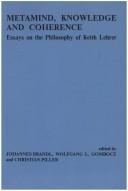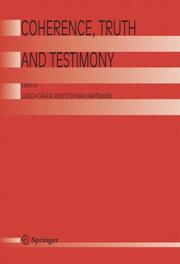| Listing 1 - 10 of 22 | << page >> |
Sort by
|
Book
ISBN: 3050030887 Year: 1996 Publisher: Berlin Akademie Verl.
Abstract | Keywords | Export | Availability | Bookmark
 Loading...
Loading...Choose an application
- Reference Manager
- EndNote
- RefWorks (Direct export to RefWorks)
Book
ISBN: 3050073519 Year: 2015 Publisher: Berlin : Akademie Verlag,
Abstract | Keywords | Export | Availability | Bookmark
 Loading...
Loading...Choose an application
- Reference Manager
- EndNote
- RefWorks (Direct export to RefWorks)
Aus dem Inhalt: Epistemologie und Wissenschaftstheorie. Der metatheoretische Rahmen. Begründungsstrategien. Kohärenz. Einwände gegen eine Kohärenztheorie der Rechtfertigung. Metarechtfertigung. Wissenschaftliche Theorien. Wissenschaftliche Erklärungen. Erklärung als Vereinheitlichung.
Book
ISBN: 0415018684 Year: 1989 Publisher: London Routledge
Abstract | Keywords | Export | Availability | Bookmark
 Loading...
Loading...Choose an application
- Reference Manager
- EndNote
- RefWorks (Direct export to RefWorks)
Truth --- Coherence theory of truth --- Coherence theory --- Theory of knowledge
Book
ISBN: 1461951402 1438448198 9781461951407 9781438448190 9781438448176 1438448171 9781438448183 143844818X Year: 2013 Publisher: Albany State university of New York press
Abstract | Keywords | Export | Availability | Bookmark
 Loading...
Loading...Choose an application
- Reference Manager
- EndNote
- RefWorks (Direct export to RefWorks)
"Continues the author's discussion of the development of the Chinese philosophical concept Li, concluding in Song and Ming dynasty Neo-Confucianism"--Provided by publisher.
Truth --- Philosophy, Chinese. --- Li. --- Coherence theory of truth --- Chinese philosophy --- Confucian ethics --- Ethics --- Philosophy, Confucian --- Coherence theory. --- Li --- Philosophy, Chinese --- Coherence theory --- Truth - Coherence theory.
Book
ISBN: 1501720473 Year: 2008 Publisher: London : Baltimore, Md. : Cornell University Press, Project MUSE,
Abstract | Keywords | Export | Availability | Bookmark
 Loading...
Loading...Choose an application
- Reference Manager
- EndNote
- RefWorks (Direct export to RefWorks)
"Real" knowing always involves a political dimension, Linda Martín Alcoff suggests. But this does not mean we need to give up realism or the possibility of truth. Recent work in continental philosophy insists on the influence that power and desire exert on knowing, whereas contemporary analytic philosophy largely ignores these political concerns in its accounts of justification and truth. Alcoff engages these traditionally conflicting approaches in a constructive dialogue, effectively spanning the analytic/continental divide.In provocative readings of major figures in the continental tradition, Alcoff shows that the work of Hans-Georg Gadamer and Michel Foucault can help rectify key problems in coherence epistemology, such as the link between coherence and truth. She also argues that discussions about knowledge among continental philosophers can benefit from the work of analytic philosophers Donald Davidson and Hilary Putnam on meaning and ontology. Alcoff makes a compelling case for the need to address truth as a metaphysical issue, in contrast to minimalist tendencies in Anglo-American philosophy and deconstructionism on the continent. Her work persuasively argues for coherentist epistemology as a more realistic reconfiguration of the ontology of truth.
Book
ISBN: 0198244010 Year: 1973 Publisher: Oxford Clarendon
Abstract | Keywords | Export | Availability | Bookmark
 Loading...
Loading...Choose an application
- Reference Manager
- EndNote
- RefWorks (Direct export to RefWorks)
Truth-Coherence theory --- Vérité comme cohérence --- Truth-Coherence theory. --- Vérité comme cohérence.

ISBN: 905183277X 9789051832778 Year: 1991 Volume: 40 Publisher: Amsterdam Rodopi
Abstract | Keywords | Export | Availability | Bookmark
 Loading...
Loading...Choose an application
- Reference Manager
- EndNote
- RefWorks (Direct export to RefWorks)
Metacognition. --- Philosophy of mind. --- Knowledge, Theory of. --- Truth --- Epistemics. --- Coherence theory. --- Truth - Coherence theory.
Book
ISBN: 150991546X 147420094X 1782255168 9781782255161 9781474200943 1782255176 9781782255178 9781849460705 9781782255178 1849460701 9781849460705 Year: 2015 Publisher: Oxford : Hart Publishing,
Abstract | Keywords | Export | Availability | Bookmark
 Loading...
Loading...Choose an application
- Reference Manager
- EndNote
- RefWorks (Direct export to RefWorks)
"In recent years coherence theories of law and adjudication have been extremely influential in legal scholarship. These theories significantly advance the case for coherentism in law. Nonetheless, in the field of coherence theory in law a number of problems remain. This ambitious new work makes the first concerted attempt to develop a coherence-based theory of legal reasoning, and in so doing addresses, or at least mitigates these problems. The book is organised in three parts. The first part provides a critical analysis of the main coherentist approaches to both normative and factual reasoning in law. The second part investigates coherence theory in a number of fields that are relevant to law: coherence theories of epistemic justification, coherentist approaches to belief revision and theory-choice, coherence theories of practical and moral reasoning, and coherence-based approaches to discourse interpretation. Taking this interdisciplinary analysis as a starting point, the third part develops a coherence-based model of legal reasoning. While this model builds upon the standard theory of legal reasoning, it also leads to rethinking some of the basic assumptions that characterise this theory, and suggests some lines along which it may be further developed. Thus, ultimately, the book not only improves upon the current state of coherence theory in law, but also contributes to the larger debate about how to articulate a theory of legal reasoning that results in better decision-making."--Bloomsbury Publishing.
Law --- Jurisprudence --- Legal reasoning --- Methodology. --- Philosophy. --- Truth --- Coherence theory. --- Coherence theory of truth
Book
ISBN: 1009055127 1009053329 1009062379 1009062565 Year: 2022 Publisher: Cambridge : Cambridge University Press,
Abstract | Keywords | Export | Availability | Bookmark
 Loading...
Loading...Choose an application
- Reference Manager
- EndNote
- RefWorks (Direct export to RefWorks)
Perhaps the most fundamental question of epistemology asks on what grounds our knowledge of the world ultimately rests. The traditional Cartesian answer is that it rests on indubitable facts arrived at through rational insight or introspection. Coherentists reject this answer, claiming instead that knowledge arises from relations of coherence or mutual support: if our beliefs cohere, we can be sure that they are mostly true. The first part of this Element introduces the reader to the main ideas and problems of coherentism. The next part describes the 'probabilistic turn', leading up to recent demonstrations that coherence fails to be conducive to truth. The final part reassesses the current debate about the proper definition of coherence from the standpoint of Rudolf Carnap's methodology of explication. The upshot is a tentative and qualified defence of one of the early coherence measures.
Knowledge, Theory of. --- Truth --- Coherence theory. --- Coherence theory of truth --- Epistemology --- Theory of knowledge --- Philosophy --- Psychology

ISBN: 1281107409 9786611107406 1402055471 1402044267 9048171253 Year: 2005 Publisher: Dordrecht, The Netherlands : Springer,
Abstract | Keywords | Export | Availability | Bookmark
 Loading...
Loading...Choose an application
- Reference Manager
- EndNote
- RefWorks (Direct export to RefWorks)
Coherence is a burgeoning topic of research. Diverse methodologies have been applied to shed light on the topic and its relevance to fundamental questions throughout philosophy. The collection brings together the full scope of this research in a single volume. The first group of essays attack the core topic of the book: coherence. Authors in this section take up the challenging and controversial task of measuring the coherence of an information set, while others criticize this endeavor. The second group of papers in the collection relate this foundational research to a wide array of epistemological and metaphysical challenges. For example, some papers consider the relationship between truth and coherence. Is coherence truth conducive, and if yes, under which conditions? A related issue taken up in this volume is the connection between coherence and testimony. Are we justified in believing coherent reports by independent, though only partially reliable witnesses more than a single report? If yes, under which conditions does this claim hold true? By the end of the book, the reader should have a comprehensive understanding of topic of coherence, the controversy surrounding it, and its implications across the discipline of philosophy.
Truth --- Philosophy. --- Coherence theory. --- Mental philosophy --- Humanities --- Coherence theory of truth --- Philosophy (General). --- Philosophy, modern. --- Philosophy, general. --- Modern Philosophy. --- Modern philosophy --- Coherence theory --- Modern philosophy.
| Listing 1 - 10 of 22 | << page >> |
Sort by
|

 Search
Search Feedback
Feedback About UniCat
About UniCat  Help
Help News
News